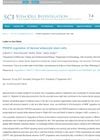3 citations,
August 2022 in “Molecules/Molecules online/Molecules annual” A new strain of bacteria from the human skin can help prevent hair loss.
 34 citations,
April 2014 in “Psychopharmacology”
34 citations,
April 2014 in “Psychopharmacology” Stress and alcohol affect brain chemicals differently in rats, mice, and humans, influenced by genetic differences.
 5 citations,
June 2017 in “in Vivo”
5 citations,
June 2017 in “in Vivo” Vitamin C deficiency changes gene expression, affecting skin and hair health.
4 citations,
May 2022 in “International journal of molecular sciences” Heat-killed Enterococcus faecalis EF-2001 may promote hair growth and transition hair follicles to the growth phase.
3 citations,
November 2022 in “International journal of molecular sciences” Bio-pulsed stimulation increases production of beneficial vesicles from bird stem cells that improve skin and hair cell functions.
 3 citations,
February 2022 in “Frontiers in Genetics”
3 citations,
February 2022 in “Frontiers in Genetics” The LncRNA AC010789.1 slows down hair loss by promoting hair follicle growth and interacting with miR-21 and the Wnt/β-catenin pathway.
 131 citations,
September 2017 in “Molecular and Cellular Endocrinology”
131 citations,
September 2017 in “Molecular and Cellular Endocrinology” The document concludes that blocking the internal pathways that create androgens might help treat cancers that depend on sex hormones.
103 citations,
December 2021 in “Journal of biological rhythms” Shift work disrupts the body's natural clock, leading to health problems.
75 citations,
February 2017 in “Aging” SkQ1 antioxidant improved health and lifespan in mice.
62 citations,
January 2015 in “Journal of Dermatological Science” New genetic discoveries may lead to better treatments for alopecia areata.
 54 citations,
January 2023 in “Signal Transduction and Targeted Therapy”
54 citations,
January 2023 in “Signal Transduction and Targeted Therapy” New therapies are being developed that target integrin pathways to treat various diseases.
 51 citations,
January 2004 in “Skin Pharmacology and Physiology”
51 citations,
January 2004 in “Skin Pharmacology and Physiology” The document explains hair growth and shedding, factors affecting it, and methods to evaluate hair loss, emphasizing the importance of skin biopsy for diagnosis.
30 citations,
September 2016 in “Aging Cell” Low selenium levels can extend lifespan but worsen health issues.
5 citations,
November 2013 in “Journal of Investigative Dermatology” The glucocorticoid receptor helps protect skin from tumors and other issues.
3 citations,
March 2023 in “International journal of molecular sciences” Keratin protein production in cells is controlled by a complex system that changes with cell type, health, and conditions like injury or cancer.
 3 citations,
September 2017 in “Stem cell investigation”
3 citations,
September 2017 in “Stem cell investigation” PDGF signaling is crucial for maintaining fat stem cells in the skin, and its level of activation can either preserve these cells or cause fibrosis.
 2 citations,
August 2019 in “Journal of skin and stem cell”
2 citations,
August 2019 in “Journal of skin and stem cell” The study concludes that regulating apoptosis could lead to new treatments for various skin and hair conditions.
 2 citations,
May 2017 in “Archives of Plastic Surgery”
2 citations,
May 2017 in “Archives of Plastic Surgery” The document concludes that understanding the evolution of the human face helps cosmetic surgeons meet aesthetic desires.
 1 citations,
May 2023 in “Frontiers in Pharmacology”
1 citations,
May 2023 in “Frontiers in Pharmacology” Millet seed oil may help hair grow by activating certain cell growth signals.
 May 2024 in “Journal of functional foods”
May 2024 in “Journal of functional foods” Coffee bean residue extract helps hair growth by activating cell processes.

Ganoderma lucidum extract may help treat stress-related hair loss.
 February 2024 in “Scientific Reports”
February 2024 in “Scientific Reports” Cinnamic acid may help hair grow by activating oxytocin receptors.

Different stem cells are key for hair growth and health, and understanding their regulation could help treat hair loss.

Thermal spring waters and their microbes could be good for skin health and treating some skin conditions in skincare products.

PTHrP is important for bone formation and may be targeted for osteoporosis treatment and longevity therapies.
June 2002 in “Science of aging knowledge environment” The cancer gene c-Myc increases harmful chemicals that damage DNA and can lead to cancer, but antioxidants can reduce this damage.
 February 2023 in “International Journal of Molecular Sciences”
February 2023 in “International Journal of Molecular Sciences” Exosomes from skin cells can boost hair growth by stimulating a gene called LEF1.
 86 citations,
December 2001 in “Experimental dermatology”
86 citations,
December 2001 in “Experimental dermatology” Mutant mice help researchers understand hair growth and related genetic factors.
 46 citations,
April 2014 in “PLOS ONE”
46 citations,
April 2014 in “PLOS ONE” Gray hair may be caused by lower antioxidant activity in hair cells.
 45 citations,
August 2018 in “Stem Cells International”
45 citations,
August 2018 in “Stem Cells International” Stem cells, especially from fat tissue and Wharton's jelly, can potentially regenerate hair follicles and treat hair loss, but more research is needed to perfect the treatment.



















